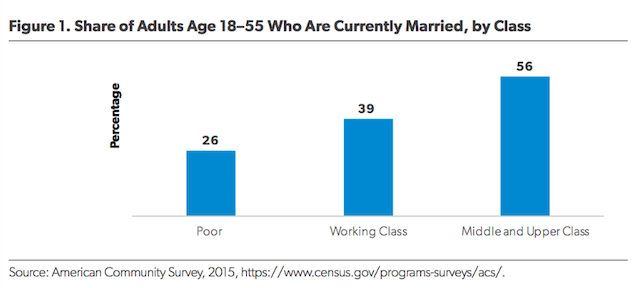Highlights
- Today, only minorities of poor adults (26 percent) and working-class adults (39 percent) ages 18 to 55 are married; by contrast, a majority (56 percent) of middle- and upper-class Americans age 18 to 55 are married. Post This
- While affluence may not be a “prerequisite for marriage,” it clearly helps to be educated and affluent if you wish to forge a strong and stable family in America today. Post This
The Fox News host Tucker Carlson delivered a monologue on the market and the family last week. It quickly found a large audience, becoming a viral sensation online. It also attracted a host of critics from across the political spectrum. Some of the fiercest criticism came from conservatives, including writers such as Ben Shapiro and David French, who attacked the very argument that we believe Carlson largely got right: Contemporary capitalism, small government conservatism, and elite negligence have all played a role in the fall of the working-class family.
Let’s review the three key points Carlson made regarding the erosion of marriage and family life in America. First, he argued that “increasingly, marriage is a luxury only the affluent in America can afford.” French, a senior writer for National Review, objected to the idea that only the rich can marry, arguing that “affluence is not a prerequisite for marriage.”
But Carlson is onto something. A half-century ago, there were not big differences in marriage and family life by class; the vast majority of Americans got and stayed married. Starting in the late ’60s, however, marriage eroded among the poor, and since the ’80s, it has lost considerable ground among the working class. Today, only minorities of poor adults (26 percent) and working-class adults (39 percent) ages 18 to 55 are married; by contrast, a majority (56 percent) of middle- and upper-class Americans age 18 to 55 are married.

In fact, dramatic increases in nonmarital childbearing, divorce, and family instability among the working class mean that only about 55 percent of children with working-class mothers will reach age 14 in a home headed by two biological parents. That compares to about 77 percent of children with college-educated mothers in more middle- and upper-class homes. While affluence may not be a “prerequisite for marriage,” it clearly helps to be educated and affluent if you wish to forge a strong and stable family in America today.
Continue reading at The Atlantic . . .













